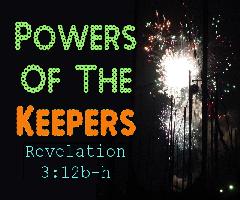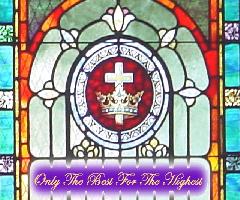Almighty God warns in Exodus and Deuteronomy that His Name should not be taken in vain. It is commonly thought that this occurs when one says His Name in disgust, flippantly, as an exclamation, or in any other irreverent way. Some think they can misuse it almost daily, go confess that sin and other sins to a priest {1} then be ready to die if it happens. We will discover these things are not so as we look at what the Holy Bible says on this matter.
I. Understand The Command - Exodus 20:7
After YHVH God and the Jewish people agree
to a covenant, YHVH sets forth the Ten Commandments as described in Exodus 20:1-17. In verse 7 we read, “You shall not take the name of YHVH your God in vain, for YHVH will not leave him unpunished who takes His name in vain.” To better understand this let us look at three terms used in this verse.“Take” can mean {2} to lift, lift up, to bear, carry, support, sustain, endure, to take, take away, and carry off. The Hebrew word for “Name” in the term “the Name” is “shem.” One of the sons of Noah was named Shem, a great ancestor of Abraham and therefore also of the physical Jews. Besides meaning a regular name like mine, Peter Macinta, it can also mean reputation, fame, glory, the Name (as designation of God), memorial, or monument. As mentioned in other articles, YHVH means “the Existing One." “In vain” can mean, emptiness, nothingness, vanity, emptiness of speech, lying, or worthlessness (of conduct).
The Name, YHVH, was highly revered by devout Jews and over the course of time most Jews did not want to say the Name due to fear of mispronunciation and other concerns. This is why there is the tetragrammaton, “YHVH” or “YHWH,” and a number of English translations print it as LORD when it occurs in the Hebrew or Aramaic texts. However, while the Name YHVH was vocally revered, the Old Testament (OT) records His Name was not being revered in the lives of many Jews as the nation of Israel grew older. By the Holy Spirit, the OT prophets indicated God would solve that problem.
According to the Father’s plan Christ was born in the fulness of time. A virgin miraculously conceived and brought forth a son, calling His Name Jesus as instructed by Gabriel. He was the means of the new covenant between God and man. Christ came to set everyone free from sin and enable each person to truly live for God. As we read the New Testament we see that the Name of Jesus Christ is the only Name by which we can be saved from our sins and the Father’s wrath (Acts 4:10-12). And His Name is above every name (Philippians 2:10).
So what does the Name “Jesus Christ" mean and why is it to be revered as the Name “YHVH" is to be? Jesus is Yeshua (Joshua) in the Hebrew and means “YHVH is salvation.” Christ (Messiah) means “The Anointed One.” In saying “Jesus Christ” we then are saying “The Existing One is salvation, The Anointed One.” Considering the whole counsel of Holy Scripture we will see the first part of this sentence would address the Godhood of our Savior, the last shows His anointed “humanhood” and the middle indicates He is the Savior. This perfectly matches His other prophetic Name, Immanuel, “God with us.”
II. The Vocal Abuse - Psalm 139:20
Ever notice that it is the Name of Jesus Christ that is most abused? Ever hear anyone vehemently say “Oh Buddha!,” or “Oh Krishna!,” or “Oh Mohammed!,” etc., when they get angry at someone or something? It might happen, but it is rare. One reason why the Name “Jesus Christ” is so abused is because that Name, and only that Name, speaks of our salvation.
Now, one would think that since His Name speaks of the means of our salvation, then no one should be against it. However, salvation in Christ means the spiritual destruction of our sin nature. Self is to die and Christ is to live through us. Self does not want to die. Sin wants to flourish and reign. In addition to that, the devil certainly does not want you to give into God and neither do the unsaved spirits, embodied as people, of the world want you to leave them.
Satan belittles anything holy unto God and the Name of Jesus Christ is no exception. Just the fact that mainly, almost exclusively, the Name of Jesus Christ is so universally abused should logically point to the fact that He is the Truth. It should be proof enough to the atheist and agnostic that there is a God who through Christ wrought salvation for ours sins. But the sin nature would have us turn away from these blessed truths, otherwise we would get saved and turn from our sins.
Most of the unsaved do not know it, but they are enemies of God. James by the Holy Spirit writes in James 4:4, “You adulteresses, do you not know that friendship with the world is hostility toward God? Therefore whoever wishes to be a friend of the world makes himself an enemy of God.” And, because out of the abundance of the heart the mouth speaks (Matthew 12:34), this hostility against God shows up vocally. Thus it is written in Psalm 139:20, “And Your enemies take Your name in vain.”
III. Manner of Living - Proverbs 30:9g
Let us look again at the possible meanings of the Hebrew verb “take” in Exodus 20:7. For the context of that verse the verb can mean to lift, lift up, to bear, carry, support, sustain, endure, to take, take away, and carry off. “Lift, lift up” would ably support the thought of vocalization and so it is used in reference to vocally taking God’s Name in vain as is seen in Psalm 139:20. However, the balance of the possible definitions point to actions and conduct more than just vocalization.
In the last part of Proverbs 30:9 we read (KJV), “. . . lest I be poor, and steal, and take the name of my God in vain.” First it needs to be said Proverbs is considered a poetical work {3} by the Spirit and the point of the entire passage needs to be viewed in the context of the whole counsel of Holy Scripture in that through the power of Christ within one would not profane the Name of God by stealing when in need.
The Hebrew verb “take” in this verse can mean to catch, handle, lay hold, take hold of, seize,
wield. There is hardly a thought of vocalization here and the phrase that it is found in shows that anyone claiming to belong to God or depending upon Him who steals profanes the Name of God. So this last section of verse 9 clearly shows that taking God’s Name in vain can be done by one’s conduct.Now, let us look around us today. A lot of people, especially in the U.S.A., call themselves Christians but take the Name of Christ in vain. They may not say “Jesus Christ” in anger but they permit fornication and other sins in their lives. Many are divorced are remarried. Many support homosexual marriage. Many will curse, cheat their employer, use filthy language, dress immodestly, and more, and with no apparent sense that they need to repent and pursue holiness they still call themselves Christians. So by their actions they profane the Name of Jesus Christ, “The Existing One is salvation, the Anointed One."
Evidently many of those just mentioned have believed in vain. By the Holy Spirit Paul writes in 1 Corinthians 5:1-4, “Now I make known to you, brethren, the gospel which I preached to you, which also you received, in which also you stand, 2 by which also you are saved, if you hold fast the word which I preached to you, unless you believed in vain. 3 For I delivered to you as of first importance what I also received, that Christ died for our sins according to the Scriptures, 4 and that He was buried, and that He was raised on the third day according to the Scriptures,". Christ died for our sins. We are to live His life.
It is written in James 1:26-27, “If anyone thinks himself to be religious, and yet does not bridle his tongue but deceives his own heart, this man's religion is worthless. 27 Pure and undefiled religion in the sight of our God and Father is this: to visit orphans and widows in their distress, and to keep oneself unstained by the world.” And1 Peter 1:18 declares, “knowing that you were not redeemed with perishable things like silver or gold from your futile way of life inherited from your forefathers,”.
IV. Take The Name In Triumph - Psalm 106:47
“Save us, O YHVH our God, And gather us from among the nations, To give thanks to Your holy name And glory in Your praise.”
Psalm 106:47 is something that those who name the Name of Christ can meditate upon and pray. If we are truly saved then we are gathered out of the rest of the world to become God’s people. We should be so lovingly grateful of His salvation that we not only praise Him with our mouths but also with His life through our lives.
It is interesting to note that the command to keep the Sabbath occurs just after the initial command of Exodus 20:7 to not take the Name of God in vain. Anyone that names the Name of Christ should, when possible, obey the admonition of Hebrews 10:25 to assemble together with other Christians, especially as we approach the end of this age.
But foundationally each Christian should spend time at the feet of Jesus and learning from Him. We really learn as be trust Him and obey. With that, let us remember and follow Psalm 127:1, “Unless YHVH builds the house, They labor in vain who build it; Unless YHVH guards the city, The watchman keeps awake in vain.” If we obey this verse we will not take the Name of God in vain, with or without words, in private and in public.
One is not a Christian because they say they are, or their church says they are. A real Christian will endeavor to live in such a way that all will see “The Existing One is salvation, The Anointed One.” For those whose lives deny any part of that it is to be remembered that Exodus 20:7 ends with “. . . YHVH will not leave him unpunished who takes His name in vain.”
Notes:
{1} Please read Better Than The Confessional Booth at http://thesureword.expertscolumn.com/article/better-than-confessional-booth .
{2} From an electronic version of Strong’s Exhaustive Concordance by James Strong incorporated in the Online Bible program, and so throughout the article whenever the ancient language is referred to and no other authority is cited.
{3} See http://thesureword.expertscolumn.com/article/special-principles-for-understanding-holy-bible#Poetry
This article was written in the form of a sermon (message) outline with comments. God willing by April 4, 2017 (hopefully much sooner), you should be able to hear the actual message (sermon) by selecting a link at http://www.sapphirestreams.com/life/audioM.html#M442 .
Unless otherwise noted all Holy Scripture is from the New American Standard Bible changing LORD to YHVH as it rightly should be when the text so indicates. * = For other versions the spelling of some words is updated for our time in addition to changing LORD to YHVH as it rightly should be when the text so indicates.
Not responsible for any advertisements appearing with this article nor am I necessarily in agreement with any of them. The statements of this paragraph hold true not only for this article, but for everything I have placed on the Internet.












